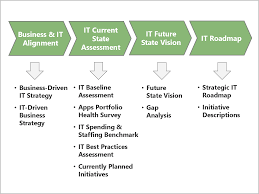Maximizing Business Success Through IT Strategy Consulting Services
The Importance of IT Strategy Consulting in Today’s Business Environment
In the fast-paced and ever-evolving world of technology, businesses need to stay ahead of the curve to remain competitive. This is where IT strategy consulting plays a crucial role. IT strategy consulting involves working with experts to develop a comprehensive plan that aligns technology with business goals and objectives.
Benefits of IT Strategy Consulting
Alignment with Business Objectives: IT strategy consulting ensures that technology initiatives are in line with the overall business strategy. This alignment helps maximize efficiency and productivity.
Risk Management: By identifying potential risks and vulnerabilities in the IT infrastructure, consultants can help businesses mitigate these risks and enhance security measures.
Cost Optimization: Consultants analyze existing systems and processes to identify areas where cost savings can be achieved through optimization or consolidation of resources.
Key Components of IT Strategy Consulting
Assessment: Consultants conduct a thorough assessment of the current IT infrastructure, processes, and systems to identify strengths, weaknesses, opportunities, and threats.
Planning: Based on the assessment, consultants develop a strategic plan that outlines goals, objectives, timelines, and resource requirements for implementing new technologies or improving existing ones.
Implementation: Consultants work closely with businesses to implement the strategic plan, ensuring a smooth transition and minimal disruption to operations.
The Future of IT Strategy Consulting
In an increasingly digital world, the demand for IT strategy consulting services is only expected to grow. Businesses that invest in developing robust IT strategies will have a competitive edge and be better positioned to adapt to changing market dynamics.
Contact us today to learn more about how our IT strategy consulting services can help your business thrive in the digital age.
9 Essential Tips for Effective IT Strategy Consulting
- Understand the client’s business goals and objectives thoroughly before proposing any IT strategy.
- Stay updated with the latest trends and technologies in the IT industry to provide innovative solutions.
- Collaborate closely with key stakeholders to ensure alignment between IT strategy and overall business strategy.
- Consider scalability and flexibility when designing IT strategies to accommodate future growth and changes.
- Evaluate risks associated with implementing new IT strategies and develop mitigation plans accordingly.
- Communicate complex technical concepts in a clear and concise manner to non-technical stakeholders.
- Regularly review and adjust IT strategies based on feedback, performance metrics, and market dynamics.
- Ensure that proposed IT strategies are cost-effective and provide measurable value to the client’s business.
- Encourage a culture of continuous learning within the organization to adapt to evolving technology landscapes.
Understand the client’s business goals and objectives thoroughly before proposing any IT strategy.
It is essential in IT strategy consulting to thoroughly understand the client’s business goals and objectives before proposing any IT strategy. By gaining a deep understanding of the client’s specific needs and desired outcomes, consultants can tailor their recommendations to align technology solutions with the overarching business objectives. This approach ensures that the proposed IT strategy is not only technically sound but also directly contributes to the client’s success and long-term growth.
Stay updated with the latest trends and technologies in the IT industry to provide innovative solutions.
To excel in IT strategy consulting, it is essential to stay updated with the latest trends and technologies in the industry. By keeping abreast of emerging innovations, consultants can offer cutting-edge solutions that address clients’ evolving needs and challenges. Embracing new technologies allows for the development of innovative strategies that drive business growth and competitive advantage.
Collaborate closely with key stakeholders to ensure alignment between IT strategy and overall business strategy.
Collaborating closely with key stakeholders is a crucial tip in IT strategy consulting to ensure alignment between IT strategy and overall business strategy. By engaging with stakeholders from various departments and levels of the organization, IT consultants can gain valuable insights into the business’s goals, challenges, and priorities. This collaboration helps in developing an IT strategy that not only meets the technological needs of the organization but also directly contributes to achieving its broader business objectives. Effective communication and collaboration with key stakeholders foster a unified vision and ensure that technology initiatives are strategically aligned with the company’s long-term success.
Consider scalability and flexibility when designing IT strategies to accommodate future growth and changes.
When engaging in IT strategy consulting, it is essential to consider scalability and flexibility in the design of strategies to accommodate future growth and changes. By incorporating scalability, businesses can ensure that their IT infrastructure can expand seamlessly as the organization grows. Flexibility allows for adjustments and adaptations to meet evolving technology trends and business requirements. This proactive approach not only prepares businesses for future challenges but also enables them to leverage opportunities for innovation and efficiency.
Evaluate risks associated with implementing new IT strategies and develop mitigation plans accordingly.
When embarking on new IT strategies, it is crucial to evaluate the potential risks that come with implementation. By identifying and understanding these risks, businesses can proactively develop mitigation plans to address them effectively. This proactive approach not only helps in minimizing potential disruptions but also ensures a smoother transition to the new IT strategies, ultimately leading to successful outcomes and improved business performance.
Communicate complex technical concepts in a clear and concise manner to non-technical stakeholders.
When engaging in IT strategy consulting, it is essential to effectively communicate complex technical concepts to non-technical stakeholders in a clear and concise manner. By translating intricate IT jargon into easily understandable language, consultants can ensure that all stakeholders, regardless of their technical expertise, grasp the significance and implications of proposed strategies. This streamlined communication approach fosters better collaboration, alignment of goals, and informed decision-making within the organization.
Regularly review and adjust IT strategies based on feedback, performance metrics, and market dynamics.
Regularly reviewing and adjusting IT strategies based on feedback, performance metrics, and market dynamics is essential for ensuring the continued relevance and effectiveness of the technology initiatives within a business. By staying attuned to feedback from stakeholders, monitoring key performance metrics, and staying informed about market trends, organizations can proactively adapt their IT strategies to meet evolving needs and seize new opportunities. This iterative approach not only fosters agility and innovation but also helps align technology investments with overall business objectives for sustained success in today’s dynamic business environment.
Ensure that proposed IT strategies are cost-effective and provide measurable value to the client’s business.
It is essential in IT strategy consulting to ensure that any proposed IT strategies are not only cost-effective but also deliver measurable value to the client’s business. By focusing on cost-effectiveness, businesses can optimize their resources and investments, maximizing the return on their IT initiatives. Additionally, emphasizing measurable value ensures that the impact of the proposed strategies can be quantified and aligned with the client’s business objectives, ultimately leading to tangible benefits and a more successful IT implementation.
Encourage a culture of continuous learning within the organization to adapt to evolving technology landscapes.
To thrive in today’s rapidly changing technology landscape, it is essential for organizations to foster a culture of continuous learning. By encouraging employees to stay updated on the latest technological advancements and trends, businesses can adapt more effectively to the evolving IT environment. This proactive approach not only enhances the organization’s competitiveness but also empowers individuals to contribute meaningfully to innovation and growth.




